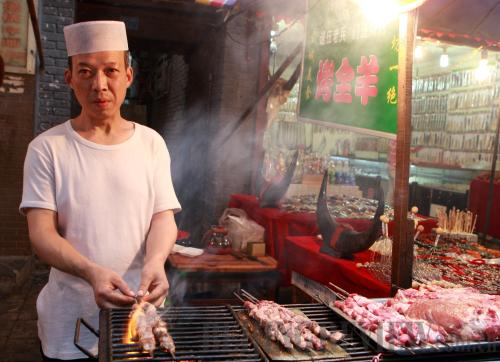|
 |
|
SNACK VENDOR: A man of Hui ethnic group sells kebabs at the Muslim Quarter in Xi'an (JIANG XIAOYING) |
Heat, history and culture of the Hui ethnic group—those are the three things first coming to mind when I think of Xi'an, capital city of northwest China's Shaanxi Province. The Hui people are Xi'an's native Muslim population. Although they are a minority in a city mostly populated by Han people, the Hui people have one district distinctly their own: the Muslim Quarter. Like many Chinese cities, Xi'an is changing fast, with a construction boom reshaping countless neighborhoods, but the Muslim Quarter remains resolutely individual, preserving its traditional atmosphere in the middle of a metropolis.
This is history meeting modernity at the very center of Xi'an. The Bell Tower loudly proclaims the city's illustrious position as an ancient capital, but its voice is lost among the new glass-fronted buildings and non-stop traffic. Away from the generic shop fronts and hidden from view by the Drum Tower, the Muslim Quarter tells its story more softly. This Hui people neighborhood was established in the Ming Dynasty (1368-1644) and has remained a unique enclave in the heart of Xi'an ever since, moving to its own rhythms, uninterrupted by the changes sweeping the city.
Most people are attracted into the Muslim Quarter after dark, when fairy lights illuminate the trees and crowds of tourists wander the streets in the area, sampling local snacks and bargaining over souvenirs. The atmosphere is recreated night after night and has proven to be an enduring success. But anybody who grows tired of this nocturnal carnival should try paying a visit early in the morning, to compare the differences that sunrise and sunset bring to the neighborhood.
Rising before six o'clock, a few devout souls attend morning prayers at one of the local mosques, but most residents start the day a little later. Scattered pedestrians slowly emerge on to the pavements, moving freely along normally crowded Beiyuanmen. Beneath their feet, oil-stained pavement still retains the smells of generations of snacks, but the shops and restaurants that thrive in the evening are yet to open. By seven o'clock, small crowds of children congregate outside the special Hui ethnic middle school, chatting and eating breakfast as they wait for the bell to sound. The atmosphere is tranquil, and the birdsong from the trees conquers all other noises for this fraction of the day.
Turning down Xiyangshi in the direction of the Great Mosque, neighborhood traders are already stepping out into the morning sunshine. Shutters creak open all around, as shopkeepers resume their daily battle with Xi'an's dust, wiping their wares with damp cloth. Everywhere you look there is food. Butchers hack at huge carcasses, preparing the beef and mutton for the day. Bakers carefully arrange their trays of fresh mo (a traditional local food made of wheat flour) in front of their stalls. Uygur families from the Xinjiang Uygur Autonomous Region warm their ovens ready to cook nang, or flatbreads, while rice and carrots for lunchtime zhua fan, a traditional food made of rice in Xinjiang, bubble in blackened pans.
Walking down a small side alley, everything is quiet again, save for a few cockerels loudly crowing somewhere deep in tightly clustered buildings. Women wearing traditional headscarves greet neighbors and begin their daily chores. Men with the Hui people's trademark dingmao hats perched atop their heads amble past the silent mosque. From a small courtyard, an old man sets off on a scooter, taking his granddaughter to school. The stalls selling traditional puppets, antiques, paintings and assorted curios are all shut, their owners enjoying a peaceful morning's rest.
Below ground, Xi'an's new subway trains are being tested, but in the Muslim Quarter people still move around at their own pace. The area buzzes with square-backed motorcycle taxis, whose drivers are in constant competition with pedestrians and cyclists as they make their way down the narrow lanes. China's automobile boom seems not to have reached this area; cars are relatively rare, and look decidedly out of place in streets that witness flocks of sheep during market days.
By half past seven, the sound of the birds has been drowned out by lively conversation, the non-stop honking of motorcycle horns and the shouts of vendors. The morning markets are now in full swing and people are enthusiastically searching for the best bargains, prodding and squeezing vegetables as they discuss prices. The sounds are swelled by propaganda broadcasts from lamppost loudspeakers, and the chopping and frying in breakfast restaurants. While the streets are still half-empty, people splash water on the pavement and roads in a futile attempt to keep the dust under control.
The Muslim Quarter is going through its unique diurnal cycle, and by eight o'clock the area is well into another stage, its sounds, smells and sights replicating those of the previous day. It will be a while before the night markets are set up and throngs of tourists arrive, when the metamorphosis will be complete. For now, the memory of the brief period when the birds were the noisiest neighbors and pedestrians ruled the roads still lingers, waiting to be rekindled tomorrow.
The author is a Briton living in China |
